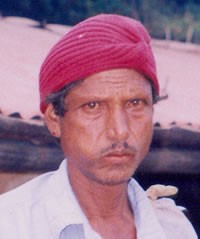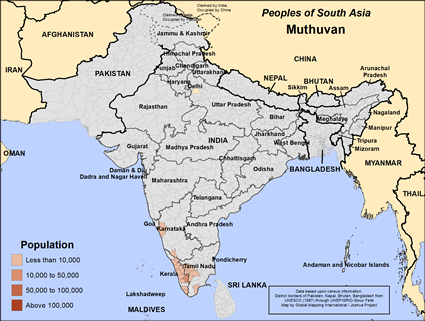Muthuvan in India

Photo Source:
Copyrighted © 2026
Philipose Vaidyar All rights reserved. Used with permission |

Map Source:
People Group data: Omid. Map geography: UNESCO / GMI. Map Design: Joshua Project
|
| People Name: | Muthuvan |
| Country: | India |
| 10/40 Window: | Yes |
| Population: | 25,000 |
| World Population: | 25,000 |
| Primary Language: | Malayalam |
| Primary Religion: | Hinduism |
| Christian Adherents: | 0.33 % |
| Evangelicals: | 0.00 % |
| Scripture: | Complete Bible |
| Ministry Resources: | Yes |
| Jesus Film: | Yes |
| Audio Recordings: | Yes |
| People Cluster: | South Asia Tribal - other |
| Affinity Bloc: | South Asian Peoples |
| Progress Level: |
|
Introduction / History
Muthuvan must have migrated from the plains most likely from Madurai. The root word Muthuku means the back of the body. It is said that when they migrated to the hills they carried their children and their belongings on the back. Even today, Muthuvan carry their children on their back.
The Muthuvan people live on the border hill forests of Kerala and Tamil Nadu. There are two different groups among the Muthuvan and they speak slightly two different dialects. Hence they call each other as Malyalam Muthuvan and Pandi Muthuvan.
What Are Their Lives Like?
The Muthuvan huts are made of reeds and thatched with its leaves. Some house walls are paneled with wooden branches and mud applied on it. The huts have two separations, one for cooking and common uses and the other for sleeping. They use the forest and brooks for bathrooms. The government has offered a special grant for these people to build houses, but most of them do not make use of it out of lack of vision for improving the living conditions.
Ragi and rice are their staple food. In addition to ragi rice and tapioca, they also eat meat of birds and lizard. Drinking liquor was not accepted traditionally. They have learned drinking from outsiders. Chewing pan is an accepted habit. Muthuvan gather food and forest products. Honey, natural spices and some wildflowers called pathiri are the commonly available products.
Some Muthuvan cultivate rice, ragi, banana, and maze. They also grow cash crops such as ginger, pepper, cardamom, beetle-nuts and lemongrass. More often the local traders and merchants reap the real benefits of their harvests. In times of emergencies, they run to local merchants who give them advances thereby buying the rights of their next harvest. Muthuvan are short-sighted. They live on a daily basis. Since they do not know how to bargain, they are the losers. This keeps them in consistent poverty.
Muthuvan do not generally go to any hospitals. They have traditional medicines which are very effective. The medicines and the medicine men are confidentially preserved and passed on to the generations. They have herbal solutions for every disease and health needs.
The law and order in the community is handled by a council of elders under the leadership of the Kani, the headman. The elders select the kani. They have various penal codes for breaking their traditions and moral standards.
For primary education they have a single school with a single hut classroom which will house all the students up to 4th classes, handled by a single teacher. The teacher and the students enjoy the freedom of choosing the subjects and hours of study! Students above the 4th grade will be sent to tribal hostels and tribal schools away in the block or district headquarters. But once they go home for vacation, few of them return to the hostels. The unfamiliar lifestyle and schedule at the hostel, being away from the parents and the village, missing all the cultural and social freedom, all these make them quit the hostels. This keeps them from gaining the literacy they need to function in modern India.
What Are Their Beliefs?
Like any other tribals, Muthuvan are animists and spirit worshippers. They worship the forest gods, the spirit of their ancestors who are believed to be the first migrants to the hill forests. Now a days, the Hindu gods and goddesses of the plains are also being worshipped, one of the effect of cultural infiltration.
When the dead are buried, the Muthuvan pray to the dead to protect the living they have left behind. Death on Saturdays is special. Pongal is the main festivals observed by the Muthuvan community.
What Are Their Needs?
It is important that someone goes to them and teaches them write and read their own language. Literacy and education can change their lives and the powers of exploitation and bondage. Knowledge can broaden their minds to the future and start thinking of a life of tomorrow. Wisdom can open their hearts to think of lives beyond the hills and the nature.
Prayer Points
Pray for them to understand and respond to Christ.
Pray God will have mercy on the Muthuvan, doing whatever it takes to place them in a position to receive him.
Ask God to open the hearts of the Muthuvan to the gospel.
Pray for an unstoppable movement to Christ among them.